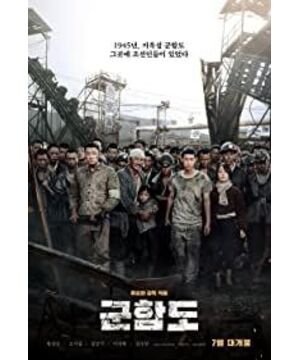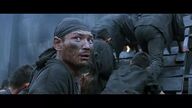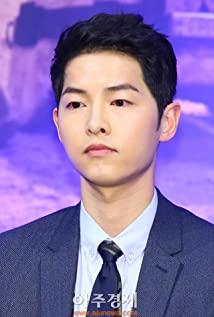Before, I was looking forward to Liu Sheng's "Gunkanjima". After all, as a super battleship in the Korean blockbuster world, this film has three major actors in the film, Wong Jung Min (which is "Huang Jung Min", "New World"), So Ji Sub ("Movies Are Movies") and Song Joong Ki ("Descendants of the Sun") ), it is also an epic theme of family and country, it is hard not to attract attention.
But after watching this film in a Taiwanese cinema, I was disappointed.
The highlight of "Gunkanjima" is the three major male stars.
This means that the film is an open, continuous development, and there are ups and downs, fronts and backs.
As a result, it's a pity.
The movie didn't write the group portraits, but talked about it, and eventually turned into a group of sensational, broken, and runaway groups of hooligans. The three protagonists don't focus on each other, and each walks aside. After that, there was no accumulation or outbreak of any emotions, and I could only use the script to move forward and drag it into a riot.
Therefore, "Gunkanjima" first broke in the script.
Huang Luwen and Su Zhixie took the same boat to the island, but the two people behind did not interact much (the most impressive thing was only the boss in the bathhouse...and the egg), that is, when we noticed one of them, the other The character was absent, and suddenly he ran out alone to take the lead in making trouble.
Not to mention, the special soldier Song Zhongji who suddenly flashed back. He should be very capable, but there is no specific, corresponding, and positive manifestation in the movie. His incarnation of justice is more like a party representative.
In terms of the character setting of the script, the Japanese director and the old Korean gentleman are actually more important than Su Ji-seop and Song Joong-ki. Not to mention, Huang Luwen is the most successful and proud of portraying the role of slick father. As the director, Liu Shengwan put the sensational big move completely on the relationship between father and daughter.
It is worth mentioning that Jin Xiu'an, who plays the role of her daughter, almost became a victim of the Japanese "comfort woman". He is very dangerous and cruel. In last year's "Travel to Busan", she also played the role of a daughter who escaped from a pile of zombies—just to take over Luo Hongzhen's "Cry", which can be called the most tenacious little girl in Korean movies.
The movie has always made a fuss about this character, even crying and howling, it has a meaning of watching a Korean theme blockbuster (of course it is originally).
So after adding such a few characters, "Gunkanjima" actually has six main characters. In the scene, it was suspected to be divided equally. The secondary characters include the Korean thugs who helped torment him, the second Japanese character who tried to get the upper hand...The film that was finally presented was supposed to be dangerous, but unexpectedly it was fragmented, with extremely facial makeup.
The only successful role is Huang Luwen, who is a quieter person. He has many short-sighted and short-sighted problems. Because of my daughter's concern, I hope to save myself, but other people have never made people more entertaining.
Su Zhixie, who is the gold medal of the underworld rogue, sacrificed a good skin just to express the slogan that "the underworld also has patriotism".
As a special soldier, Song Zhongji once made me think it was the college student with glasses. He sneaked into the fierce scene, and he did not leave a trace.
As Han Jian's old gentleman, he is shameless and messes up on both sides.
To be fair, it is difficult for Koreans to write new things in this big historical story without being able to unload the humiliating history of World War II. Originally the two sides are not evenly matched, it is difficult to write the tragedy of the decisive. Commercial operations like "Assassination" also require the urban style of Shanghai and the background of moving to China to join. If you dare not open your mouth to talk nonsense, you can only make a fuss around Han Yan at the worst and condemn the accusations. In my opinion, the anger scene of the old man being beaten to death by a crowd of people is the real climax of the movie.
As for the organized large-scale retreat, fighting with the Japanese on-site level, until the epoch-making atomic bombing scene was witnessed on the retreating ship, these are more like a romantic conjecture of World War II (as a necessary manifestation of a blockbuster movie). The fireworks explosion effect of "The Founding of the Army" has the same goal in different ways. Especially in the middle of the unity, the passage of raising the iron bridge and retreating home over the wall has made me lose the patience to watch. As for those Koreans who died tragically, sacrificed, and fell into the water, they were confused and unnecessary.
This movie dared to drag the story to 132 minutes, which is too long and too long. When I saw the 151-minute director's cut version, it was absolutely undesirable.
Liu Shengwan's ability to control the blockbuster and the subject matter stays in the life of a hellish miner. Visually black, go down, go down again. The projections of American bombers caught fire and exploded, and the Japanese overseers ignored them.
He also encountered a ruthless and embarrassing fact: if South Korean miners are tortured to be skinny, how can they show that they still have the energy to resist. If the South Korean miners still have a head, a face and a whole body, how can they show how brutal and abusive the Japanese are. What finally emerged was that the desperate life of Gunkanjima was actually at the end of the war, and the process was short-lived. Koreans can organize resistance and riots in an orderly manner.
For Gunkanjima itself, although it takes a huge budget to set up the scene to restore the history, looking at the entire movie, it always lacks an overall and panoramic depiction operation, and hastily scribbled.
The jazz orchestra led by Huang Luwen served as a good metaphor for the humanity remaining in the war. This is more than his personal escape and is the easiest desire to achieve.
However, in the story line that the Japanese are bad and Han Jian is even worse, "Gunkanjima" has nothing new to come up with. The big scenes, the big battles, and the big country, these contents have caused the whole movie to be too small and unable to give other characters the necessary details and flesh and blood, not to mention the human touch and the real atmosphere. The group portrait shaping finally turned multiple characters into imaginary stereotypes, like entering a history museum, listening to a tour guide explaining the words, and taking a ready-made class.
Perhaps this is the reason why "Gunkanjima" lost to " Taxi Driver " this summer .
Facing the big historical war, Song Kanghao used the old driver's small size to make it easier for the audience to be brought into a real social era.
View more about The Battleship Island reviews











